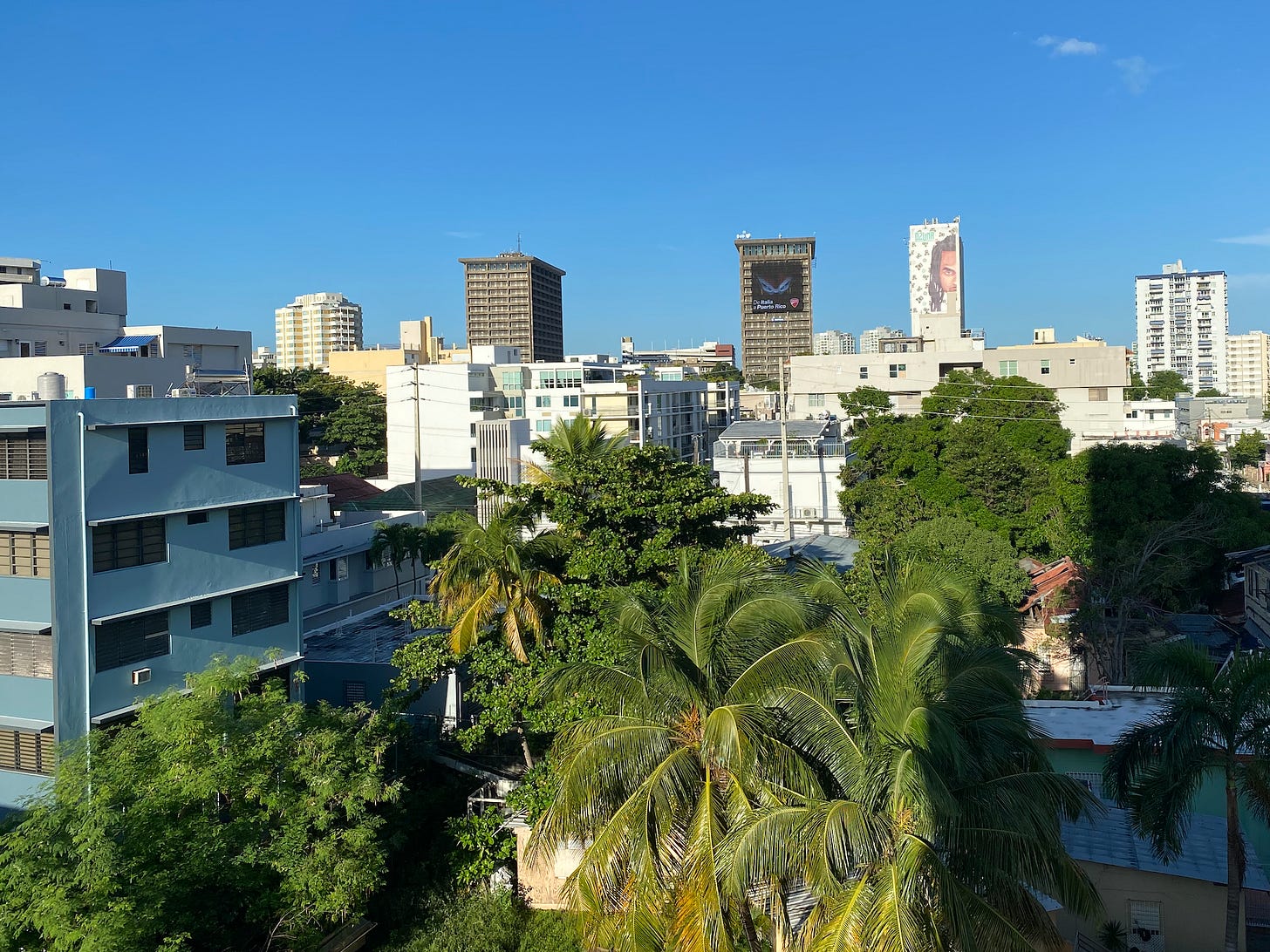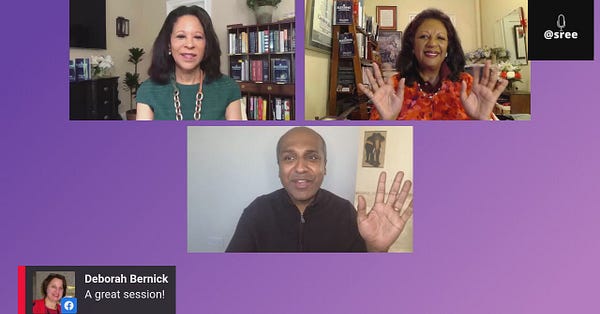Our era of convenience set us up for disaster
Much of the hardship we’ve gone through could have been avoided with relatively simple measures.

Sree’s Sunday Note newsletter is produced w/ Zach Peterson (@zachprague). Coconut trees and blue skies in San Juan, Puerto Rico, where I’m spending a week (looks a lot like Kerala, India). They have mandatory mask-wearing, temperature-taking and hand-sanitizer-using rules, along with a 10pm to 5am curfew - feels a lot safer than many other places in the U.S.
Scroll down for Read Something; Watch Something; and a weekly tech tip from Robert S. Anthony (@newyorkbob).
TUNE IN: Sunday #NYTReadalong, 8:30 am ET, live or later. Our guest this week is Alex Kingsbury, Editorials Editor, and member of The New York Times editorial board. He oversaw this week’s special “End our National Crisis” opinion project. At 9 pm ET, we will have another Sunday-night positivity episode of the Daily, Global Covid Show.
The best way to know when I’m on the air and see all my archived Covid19 shows, is to subscribe to my YouTube channel. We’ve been going for 222 straight days!
My Digimentors team is working with companies and nonprofits around the world to create virtual events. We’ve worked on events for 50 people and 100,000 people. See our new brochure. Don’t cancel or postpone your conference - contact us! sree@sree.net
***
My Daily, Global Covid Show is coming up on its 250th episode. At this point, it’s essentially a running index of life in New York and the wider US since early March, and it’s taught me so much.
I’ve had some of the world’s top Covid19 experts on since the beginning of all of this and one thing that keeps coming back to me is this:
Much of the pain and hardship we’ve gone through since March could have been avoided with relatively simple measures. New York City, I’m proud to say, has done pretty well since the initial disaster — all it took was people coming together and simply acknowledging the fact that they may be inconvenienced and uncomfortable at times.
This has not happened across the country and it’s become clear to me that our obsession with convenience has been our undoing all along. The perfect example also happens to be one of the most important: Masks.
They work. Simply wearing them in enclosed spaces drastically reduces the spread of the virus. There is an ever-growing mountain of evidence that masks are the closest thing we have to a vaccine right now.
Somewhere along the pandemic timeline masks became political, and eventually evolved into one of the President’s pet issues. We saw much the same in the spring and summer too, with protests against lockdown measures.
Frankly, I hear it as well from friends and acquaintances who are becoming a bit fed up with mask rules, distancing, and all the rest — they want things to be “normal” again. To which I say, “Welcome to the club!” Of course, I want everything to be “normal” again.
But it isn’t normal, and there are several minimally-intensive things we can all do that will help us return to something resembling “normal.” These things require being inconvenienced, uncomfortable, and may take time — but they are worth it. Wearing a mask to the grocery store isn’t exactly a sacrifice, after all.
All of this really got me thinking about convenience, and how it’s become so entrenched in our society. It’s not all bad! Under lockdown, delivery services like Amazon Prime were, and continue to be, absolutely crucial to the point of being life-saving.
But, I can’t help but think that the impulses and behavior that has led us to a place where you can get basically anything you want brought to your door within hours. Comedian and Daily Show correspondent Ronnie Chieng has a great stand-up bit about exactly this. What starts as a sort of regular bit about how “we need it all and we need it now,” ends up hitting hard.
I understand the searing desire for everything to return to some semblance of “normal.” But, for the first time in a long time, we’re all being asked to make real sacrifices and change our behavior for the greater good. So far, we’ve largely failed and it’s cost nearly 250,000 lives in the US alone.
- Sree
Our friends at the Greater Providence Chamber of Commerce hosted an interview w/ Dr. Ashish Jha (@AshishKJha - the new Dean of Brown School of Public Health) on Friday, and President Laurie White (@LW_ProvChamber) gave me the honor of asking a few questions. It’s one of the most insightful sessions you will see about where we are, where we go from here and how we got here. Don’t miss it!
Read Something
You could be forgiven for missing this piece by Andrew Marantz (@andrewmarantz) in the New Yorker this week, but I hope you take the time to read it (or take 46 minutes and listen to it as I did). Facebook has repeatedly shown itself incapable of understanding its influence in and on the world — and it’s repeatedly been shown to be out of its depths when it tries to address the myriad ill effects directly attributed to the platform.


Sponsor Message: Global Entrepreneurship Experience After-School Program @Rutgers
With most extracurricular activities canceled, take advantage of this new virtual entrepreneurship after school program starting Oct 21 for teens at which I am honored to be a lecturer. An entrepreneurial mindset and business/life skills are going to be even more important post-pandemic.
Register here: globalentrepreneurshipexperience.org
Tech Tips from @NewYorkBob: Microsoft’s Budget Surface Laptop Go: Ready and Set

Each week, veteran tech journalist Robert S. Anthony shares a tech tip you don’t want to miss. Follow him on @newyorkbob.
While Apple and Google were making noise recently with high-end gadget debuts, Microsoft chimed in quietly with a budget-priced laptop which seems to fit right in with the era of Zooming: The Surface Laptop Go.
With pricing starting at $550, the Surface Laptop Go comes with a 12.4-inch PixelSense touchscreen, a 720p front video camera, dual far-field microphones and Bluetooth 5.0 and Wi-Fi 6 wireless support. The thin, 2.45-lb. case has a footprint slightly smaller than a sheet of paper, but still houses a full-size keyboard and USB-A and USB-C ports.
The unit isn’t a muscle laptop like its more expensive Surface Laptop siblings, but with its Intel Core i5 processor, the Surface Laptop Go should easily handle work and school tasks like web browsing, videoconferencing and word processing. However, with just office-level Intel UHD graphics hardware, modest 1,536-by-1,024-pixel screen resolution and 4GB or 8GB of RAM, it’s not the right unit for video editing or gaming—unless you enjoy losing.
Note that the Surface Laptop Go comes with Windows 10 S, a version which limits users to Windows apps in the Microsoft Store. However, users can get around this limitation by switching the unit to Windows 10 Pro—a permanent, but free process.
No, you won’t be editing 4K videos with the Surface Laptop Go, but you won’t be the one in the Zoom session sounding like you’re underwater either.
Listen to Something
I learned via Mike Allen’s excellent newsletter that Axios just launched “Hard Truths,” a new podcast project that will examine systemic racism in America. It’s a yearlong series that will cover education, housing, technology, and health care. The episode is Axios-length at 12 minutes, but that’s what Axios does well, and this is quite good. Listen here or on your podcast platform of choice. Congrats to my friend Niala Boodhoo and the Hard Truths team, which includes Carol Wu, Cara Shillenn, Nuria Marquez Martinez, Dan Bobkoff, Sara Kehaulani Goo, Alex Sugiura and Naomi Shavin.
Watch Something
This week, I had Bonita C. Stewart, VP of Global Partnerships at Google, and Jacqueline Adams, communications strategist and Emmy-winning former CBS News correspondent, on my Daily, Global Show. They talked about their new book, “A Blessing” on women of color leading, empowering, thriving. A highlight for me and the show and I hope you’ll watch.


Odds & Ends
🗞 Sundays are busy at Digimentors. 8:30-10:15 am ET, we read the print edition of the NYT out loud for you to watch live or later. 9-10 pm ET, we interview generally positive people to put some pep in our step as we go into the new week. Today’s videos:
Sunday #NYTReadalong w/ Alex Kingsbury, Editorials Editor, on The New York Times editorial board.
Daily Global Covid19 Show, 9 pm ET (or anytime later you like): http://youtube.com/sreenet
The Readalong is followed Sundays 11 am-noon ET by a new medical show I’m co-executive producing with surgeons Sujana Chandrasekhar, M.D. (@DrSujanaENT), and Marina Kurian, M.D. (@MarinaKurian), called She’s On Call (watch live or later).
The Sunday #NYTReadalong is sponsored by Muck Rack and Strategy Focused Group. Interested in sponsorship opportunities? Email sree@digimentors.group and neil@digimentors.group.
🎧 Every Saturday, I host a call-in show on WBAI 99.5FM (@wbai) - "Coping with Covid19" - focused on being helpful, hopeful, and focusing on the pandemic's effects on society’s most vulnerable. Listen live Saturdays from 12-2pm EST, or later. And, of course, call in or tweet questions for us using the #wbaisree hashtag! Listen to a recent episode here!
📺 A reminder to watch my Daily Global Show. You’ll laugh, you’ll cry, you’ll learn something every time. We’ve had 220+ shows and 350+ guests - and 1m+ viewers. Check out the archive and please subscribe to my YouTube channel. And/or sign up for my WhatsApp alerts list (it’s not your typical WhatsApp group, just a text when I’m live!). We are in partnership with Scroll.in, one of India’s best news and culture websites.
Recent highlights:
Sapphire, whose novel became Oscar-winning “Precious” (she’s newly on Twitter!)
Dr. Keiji Fukuda of HKU, former pandemics expert at WHO & CDC
👀 Did we miss anything? Make a mistake? Do you have an idea for anything we’re up to? Let us know! Let’s collaborate!




